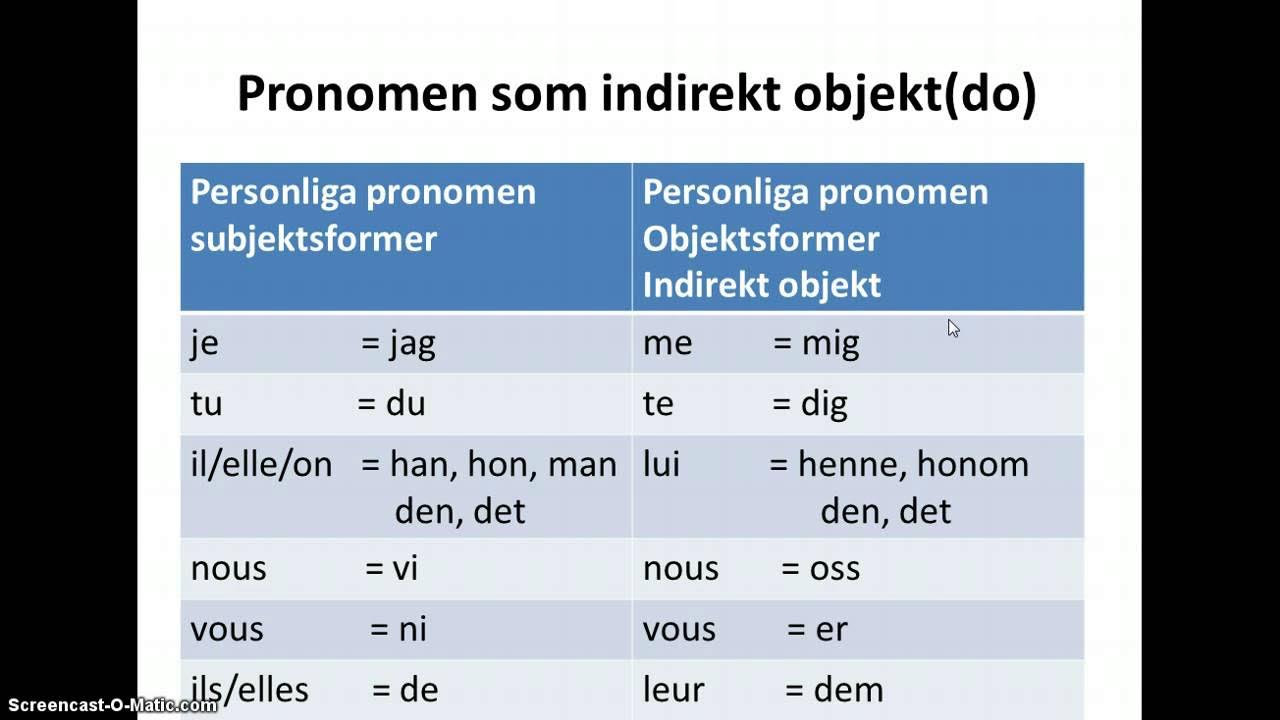How to use Direct Object Pronouns in French 🇫🇷
Summary
TLDRThe transcript appears to be a French language lesson focusing on object pronouns and their usage in sentences. It covers direct object pronouns, gender agreement, and conjugation in various tenses. The lesson includes examples such as watching a film, listening to music, and being invited to eat cake. It also touches on the use of 'le' and 'la' for masculine and feminine gender agreement and the importance of matching pronouns with their corresponding objects.
Takeaways
- 🇫🇷 The script is about French language learning, focusing on grammar concepts such as direct object pronouns.
- 🎬 The script uses examples like 'je regarde le film' to explain the use of direct object pronouns in French.
- 📚 It discusses the gender and number agreement in French, such as 'le' for masculine singular nouns.
- 👥 The script includes examples of conjugation and the use of pronouns with verbs like 'regarder' and 'manger'.
- 🎶 There are multiple instances of [Musique], indicating pauses or breaks, possibly for listening or practicing.
- 📖 The script touches on the concept of being good at something in the past but not anymore, using 'j'étais bon en math mais je ne le suis plus'.
- 🗣️ It provides examples of negative constructions, such as 'je ne le prends plus'.
- 👪 The script includes family-related vocabulary and sentences, like 'nous emmène au parc' and 'votre père vous invite'.
- 🍰 There's an example of a command form, 'donne les ordres', which is a direct imperative to give orders.
- 👩👧 The script ends with polite expressions like 'au revoir', 'à bientôt', and 'bisous', which are used to say goodbye in French.
Q & A
What is the term for 'COD' in French?
-In the transcript, 'COD' is mentioned in the context of French grammar. It stands for 'complément d'objet direct', which translates to 'direct object complement' in English.
How is the direct object complement used in a sentence?
-The direct object complement is used to provide more information about the direct object. For example, in the sentence 'Je regarde le film' (I watch the movie), 'le film' is the direct object complement.
What is the role of gender in French language?
-Gender in French is an important aspect of the language as it affects the agreement of adjectives, articles, and pronouns with the nouns they refer to. In the transcript, it mentions 'le' for masculine and 'la' for feminine nouns.
Can you provide an example of a sentence using a direct object pronoun?
-Sure, an example from the transcript is 'Je le regarde' (I watch it), where 'le' is the direct object pronoun referring to a previously mentioned masculine noun.
What does 'laostropie' mean in the context of the transcript?
-The term 'laostropie' seems to be a typo or a mispronunciation. It might be referring to 'l'anostrose', which is a term used in French to describe a decrease in ability or performance over time.
How does the transcript explain the change from being good at math to not being good anymore?
-The transcript uses the phrase 'j'étais bon en math mais je ne le suis plus' to illustrate the change, meaning 'I was good at math but I am not anymore'.
What is the meaning of 'nous' and 'vous' in French?
-'Nous' means 'we' and 'vous' means 'you' in French. They are personal pronouns used for the first person plural and the second person plural or formal singular, respectively.
What is the purpose of the direct object pronoun 'le' in the sentence 'je le prends'?
-In the sentence 'je le prends' (I take it), 'le' is a direct object pronoun that replaces the direct object 'cela' or 'ça' (it), making the sentence more concise.
How is the invitation to eat expressed in French according to the transcript?
-The transcript shows the expression 'vous nous invitez à manger' (you invite us to eat), which is a way to invite someone to eat in French.
What does the transcript suggest about the use of 'à bientôt' and 'bisous'?
-The transcript implies that 'à bientôt' (see you soon) and 'bisous' (kisses) are used as farewell expressions in French.
Can you provide an example of a sentence using the phrase 'compliment d'objet indirect' mentioned in the transcript?
-The transcript does not explicitly mention 'complément d'objet indirect' (indirect object complement), but an example could be 'Je donne un livre à mon ami' (I give a book to my friend), where 'à mon ami' is the indirect object complement.
Outlines

This section is available to paid users only. Please upgrade to access this part.
Upgrade NowMindmap

This section is available to paid users only. Please upgrade to access this part.
Upgrade NowKeywords

This section is available to paid users only. Please upgrade to access this part.
Upgrade NowHighlights

This section is available to paid users only. Please upgrade to access this part.
Upgrade NowTranscripts

This section is available to paid users only. Please upgrade to access this part.
Upgrade Now5.0 / 5 (0 votes)





